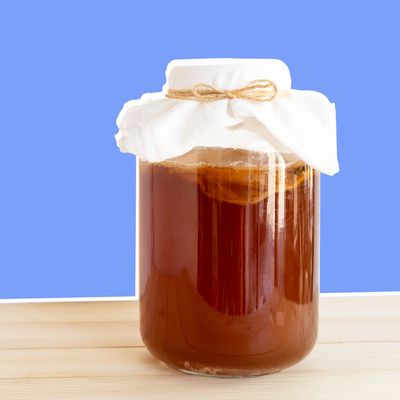
After three or four years’ worth of pronouncements that kombucha is “disgusting” and “vile,” and that I would “rather drink spit,” I have come to the alarming and disappointing realization that I love kombucha. It is my mother’s fault, because she had some in the refrigerator when I last visited home, and as she likes to remind me, what I most like to eat is whatever food she’s bought for herself. Did you know kombucha is just fizzy flavored juice, basically? Except not as sugary, and better for you? Yes, the “scoby” aspect is too gross to even think about, but that’s not an issue when you buy your kombucha for $5 at a bodega. There is (usually) nothing viscous or solid at the bottom of my bottle. There is only this magic beverage, which promises to detoxify/clean/cure my “gut” of all that is wrong with it, which is presumably everything.
How does it do this? Probiotic cultures. Until now, my admittedly vague understanding of what exactly probiotics do has been gathered by internet osmosis. It promotes good digestion? It’s good for hangovers? I don’t know. Probiotics are just one of those things that seem important to do now that I’m in my 30s, like vitamins. And, ah, just like vitamins, it turns out that they are mostly … useless, and maybe even bad for you.
Part of the problem is regulation — like many supplements espoused by the wellness industry, probiotics rely on unbacked claims and word-of-mouth support to circulate their supposed benefits. In a recent study, associate professor of medicine at Cambridge Health Alliance Pieter A. Cohen cites a 2016–2017 FDA inspection of more than 650 facilities producing dietary supplements, which found that more than half of those facilities had violations regarding the purity, strength, and identity of the advertised product.
More concerning, there are also safety issues, including the potential for transmission of antibiotic-resistant genes, and the potential for toxicity in the living microbes being consumed. Cohen also reports that probiotics can lead to infections, particularly among immune-compromised individuals like infants, older people, and people with autoimmune disorders.
The evidence for probiotics’ benefits are unsatisfyingly (and, to me at least, surprisingly) mixed: a systematic review from earlier this year found that certain (but not all) strains were helpful to children suffering antibiotic-induced diarrhea, and that they also seem to prevent “necrotizing enterocolitis (a serious gastrointestinal condition) and death in preterm infants,” per the New York Times. And … that’s about it. The Times also refers to another 15 or 20 studies done on probiotics’ potential benefits, but let me save you the time: none of them are promising, and few of the studies are robust to begin with. And because these studies are done with precisely identified and measured probiotic strains, and what we buy at the pharmacy (or the bodega) is much more nebulous, we’re even less likely to benefit than those study subjects.
I am not going to dump my kombucha down the drain, because that was $5 I’ll never get back. And as long as we’ve got healthy immune systems, we can still enjoy our kombucha, and yogurt, and other probiotic-rich foods — but all available evidence suggests we probably shouldn’t count on them doing anything to make our guts healthier.





